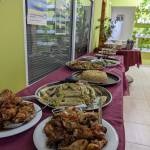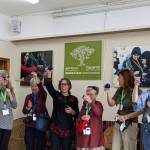Mosaic of Peace Reflection
by Megan D. Acedo
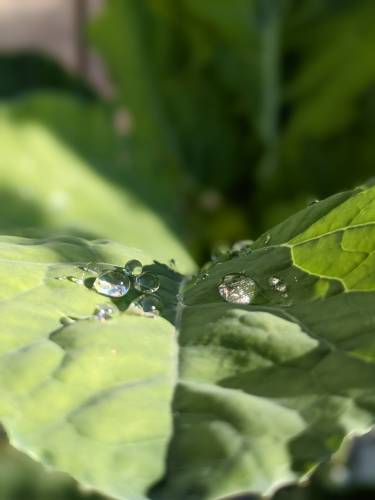 One of my small group members said in our last meeting that perhaps “peace in the Israeli Palestinian conflict means Palestine needs to surrender,” to walk away, give up, and find a land and a place of their own. I fully understand the cynicism as we have spent 11 days here at this point and each story is both harder and more beautiful to hear than the last. With each conversation the aspiration of peace seems more and more impossible while the resilience of the Palestinian people shines brighter and stronger. It is a tension that feels difficult to hold. While I struggled with what he said, our small group member bravely articulated what most of us were probably thinking.
One of my small group members said in our last meeting that perhaps “peace in the Israeli Palestinian conflict means Palestine needs to surrender,” to walk away, give up, and find a land and a place of their own. I fully understand the cynicism as we have spent 11 days here at this point and each story is both harder and more beautiful to hear than the last. With each conversation the aspiration of peace seems more and more impossible while the resilience of the Palestinian people shines brighter and stronger. It is a tension that feels difficult to hold. While I struggled with what he said, our small group member bravely articulated what most of us were probably thinking.
And yet…
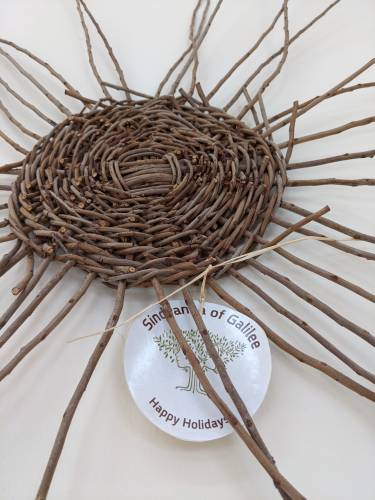 One day you are introduced to a place like Sindyanna of Galilee. Sindyanna is a fair-trade organization and co-op led by Arab and Jewish women with the goals of empowering women, especially Arab women without education, and promoting a common life and future for Arab and Jewish people in Israel Palestine. Their goal is collaboration: collaborate not hate. Sindyanna was started in 1996 and is “the only certified fair-trade olive oil producer that operates among the country’s Arab population bringing deep functional expertise and a practical approach to build capabilities and deliver real impact.”[1]
One day you are introduced to a place like Sindyanna of Galilee. Sindyanna is a fair-trade organization and co-op led by Arab and Jewish women with the goals of empowering women, especially Arab women without education, and promoting a common life and future for Arab and Jewish people in Israel Palestine. Their goal is collaboration: collaborate not hate. Sindyanna was started in 1996 and is “the only certified fair-trade olive oil producer that operates among the country’s Arab population bringing deep functional expertise and a practical approach to build capabilities and deliver real impact.”[1]
Our host, Nadia Giol, talked about how important the land is and what a central role it plays in their lives. She shared with us that before 1948, Arabs owned 95% of the land and that after 1948, they owned only 5% of the land. Today, in 2022, they own only 3-4% of the land. She said, “the land is always the issue.” As I listened to Nadia, I could not help but sense that, despite the struggle, her optimism and hope was contagious. It was contagious to me, and I can imagine how contagious it is to the people she works with on a regular basis. Bringing together Jewish and Arab women for education, collaboration, and connection is perhaps the boldest and most idealistic act one could do in this day and age in the Israeli Palestinian conflict.
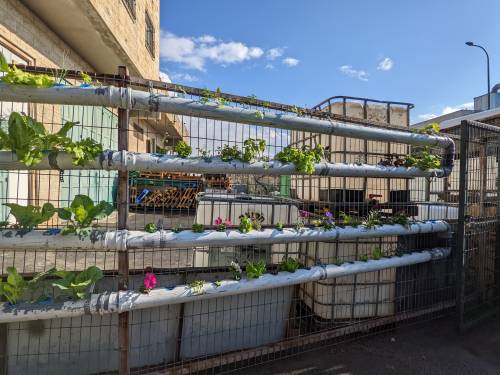 Nadia shared that most Arab women who come to Sindyanna come looking for skills. Most Jewish women come looking for connection. The women in the organization started a hydroponic farm during the pandemic. Now 30 women grow their produce this way and 10 of them sell their produce to local restaurants and a partnership of these women made the delicious lunch of which we partook that afternoon.
Nadia shared that most Arab women who come to Sindyanna come looking for skills. Most Jewish women come looking for connection. The women in the organization started a hydroponic farm during the pandemic. Now 30 women grow their produce this way and 10 of them sell their produce to local restaurants and a partnership of these women made the delicious lunch of which we partook that afternoon.
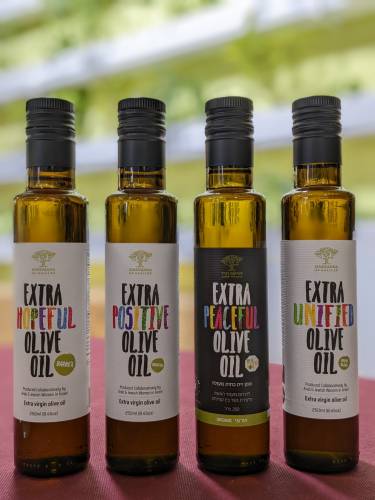 Our last act before lunch was to participate in an olive oil tasting. Five of our group members joined Nadia at the front to taste the olive oil. She told us that the soil and climate affects the color and taste of olive oil, along with what type of olive it is and when it is harvested. Sindyanna has four different kinds of olive oil, all with hopeful, optimistic names: Extra Hopeful Olive Oil, Extra Positive Olive Oil, Extra Peaceful Olive Oil, and Extra Unified Olive Oil. Our group delighted in the olive oil tasting, though no one was able to truly identify which olive oil they had in their glass. I suppose it’s a good excuse to buy one of each and do a taste test at home!
Our last act before lunch was to participate in an olive oil tasting. Five of our group members joined Nadia at the front to taste the olive oil. She told us that the soil and climate affects the color and taste of olive oil, along with what type of olive it is and when it is harvested. Sindyanna has four different kinds of olive oil, all with hopeful, optimistic names: Extra Hopeful Olive Oil, Extra Positive Olive Oil, Extra Peaceful Olive Oil, and Extra Unified Olive Oil. Our group delighted in the olive oil tasting, though no one was able to truly identify which olive oil they had in their glass. I suppose it’s a good excuse to buy one of each and do a taste test at home!
***
I reflected a lot on my small group member’s thoughts they shared with us. I struggled with them. Fought them. Surrendered to them myself. It was vulnerable of them to articulate this very real perspective borne out of decades of life and ministry experience, decades more than I have. I myself have been there and continue to return to that perspective often as I process all that we have witnessed and all the stories we have heard. At times it seems hopeless.
But to me, surrender is not peace. In English, we have nearly rendered “peace” to be meaningless, simply to mean an absence of conflict. But the word from which we derive peace, “shalom,” means flourishing, wholeness, and completeness in Hebrew, the language of Israel. In Arabic, “salaam” is the word for peace and the root word “slm” in Semitic languages (from which both Arabic and Hebrew are derived) means safety, security, peace, submission, and surrender. So then true peace for all people in the region would mean that we need to continue to work towards the social change that Sindyanna works toward. As Nadia said to us, “We are [making] a social change that is for the well-being of all the people. Those who want to join us will. Those who disagree with what we are doing just mean we will have a lot of work to do.” Peace in the region means both flourishing and surrender. It means wholeness and security. It means both completeness and submission. It is not about one side walking away defeated in passive surrender, but it means both sides surrendering, actively and in whatever ways possible, to a third way to peace.
A place like Sindyanna of Galilee provides a possible third way to peace, or at least it provides fertile ground for it. Their model is incredible. It is educational, and it is inspirational.
[1] https://www.sindyanna.com/about-us/overview/
